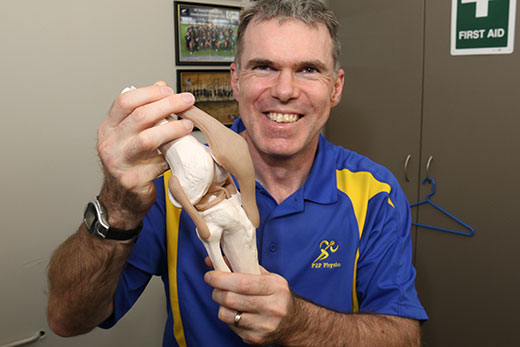A programme designed to reduce injuries in football and the number of the players on the sideline, while saving millions in the process is set stretch its way into Tauranga.
Tauranga City United and Prevention to Performance physiotherapist Hamish Ashton endorses New Zealand Football's FIFA 11 prevention programme. Photo: Tracy Hardy.
This week the FIFA 11+ injury prevention programme was launched by New Zealand Football medical director Dr Mark Fulcher to tackle the sports issue costing about $25millon per year.
Run in partnership with ACC, the programme - designed by FIFA on the back of comprehensive research commissioned across all levels of the game - centres around a warm-up which reduces the risk of injury in football.
"It's a 20-minute warm-up designed to be done in place of a more standard warm-up and if we can do this twice a week we can reduce the risk of injury significantly,” says Fulcher.
"It really is a no-brainer, the programme has been studied extremely well and we know by using the warm-up we can reduce the risk of severe injury by 50 percent and reduce the risk of all injury by 30 percent.
"At a personal level, players obviously don't like getting injured and New Zealand Football is concerned about the welfare of our playing group so it's a simple, effective way we can look after our players.
From a financial point of view, the cost to New Zealand of football-related injuries each year is about $25m, and if the organisation can reduce the risk of injury it will provide a massive saving for the community.
Tauranga's Prevention to Performance physiotherapist Hamish Ashton, supportive of the nationwide rollout, says the research behind it is incredibly sound with clubs of all ages especially youth footballers and younger senior footballers.
The scheme was based on research carried out by American and Norwegian scientists and was used by football teams such as Barcelona and national teams from Spain, Germany and Brazil.
'The major finding is those who do it properly – properly being the important thing – and regularly show a 40-50 per cent decrease in injuries to knees and ankles which are the majority of injuries we get in football.
'ACC stats show there is 25 million spent football injures over the year so if you take 40-50 per cent off that you take out a good dent in the cost to the community to something that's easily done.”
Tauranga City United physiotherapist for the past two seasons, Ashton routinely deals with the injuries and with the football season winding into gear any programme or initiatives helping educate athletes is positive.
He says a lot of the injuries are to do with movement patterns and balance, as well as non-contact or not having proper strength control around knees and hips – something FIFA 11+ looks to strengthen.
And while the younger grades are more easily swayed it is the senior players proving more difficult to changes their ways.
'It comes down to education, if you can tell them you can keep them on the field and they won't be sitting on the sideline injured then they might grumble a little bit but they do it and see the point of it.
'Getting players warming up and cooling down properly is a bit of push and shove. They like to play the game and not warming up beforehand.”
Mirroring work being done in some of the world's top football nations, the delivery of the programme includes a series of workshops scheduled in each federation during the year while it has also been included in the schedule of New Zealand's elite sides, coaching courses and as part of the code's club development scheme.
Fulcher says the workshops will see participants leave as FIFA-certified instructors in the programme and that growing pool of people will be able to spread the word about injury prevention.
"Our goal for this year is to educate 500 trainers and we're already down the path a little bit,” says Fulcher
"Success will be seeing the FIFA 11+ being delivered at every club across the country. Over the next three years, as we continue this work with ACC, hopefully more and more players are doing the programme and we'll see some tangible change in our injury statistics."
Other main winter codes, rugby, rugby league and netball, are all interested in the programme.
The programme is currently being rolled out around the country, with a number of practical demonstrations including in Tauranga on March 30.



0 comments
Leave a Comment
You must be logged in to make a comment.